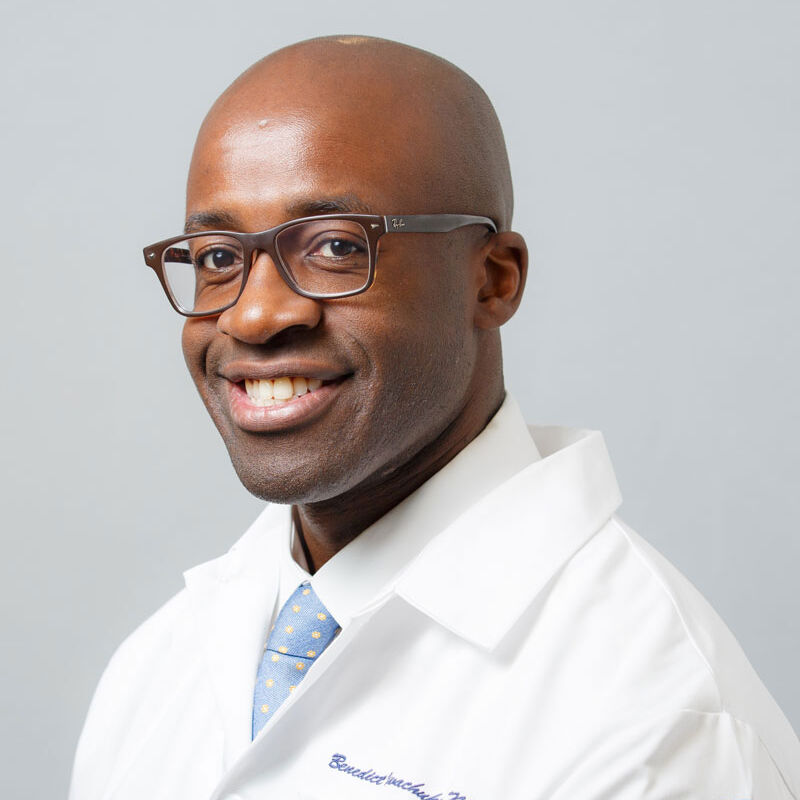Frozen Shoulder Specialist

Are you experiencing a stiff shoulder? If so, you may be suffering from a condition known as adhesive capsulitis, also known as frozen shoulder. Frozen shoulder typically affects patients between the ages of 40 and 60 years, and females are much more likely to develop this condition than males. Frozen shoulder specialist, Doctor Benedict Nwachukwu provides diagnosis as well as surgical and nonsurgical treatment options for patients in Manhattan, New York City, NY who have suffered from stiff or frozen shoulder. Contact Dr. Nwachukwu’s team today!
What is a frozen shoulder?
Frozen shoulder, also known clinically as Adhesive Capsulitis is a shoulder joint condition that can cause symptoms of pain, stiffness and limited movement. Caused by “adhesions,” or scar tissue, that develops when the connective tissue surrounding the joint thickens and tightens. This scar tissue contributes to a loss of motion and restricts arm movement. The symptoms of frozen shoulder typically begin gradually and worsen overtime and can result in a complete loss of function of the shoulder joint, making simple daily tasks painful and difficult. Dr. Benedict Nwachukwu, orthopedic shoulder specialist serving patients in Manhattan, New York City and the surrounding New York boroughs has extensive experience in treating patients with frozen shoulder, adhesive capsulitis and other symptoms of shoulder pain and stiffness.
What are the stages of frozen shoulder?
Frozen shoulder typically develops over time and in three stages:
- Freezing Stage: Any shoulder movement causes pain and range of motion becomes limited. Freezing stage can last 6 weeks to 9 months.
- Frozen Stage: Pain often decreases during the frozen stage; however stiffness remains. Extremes in shoulder movement cause pain and daily activities such as dressing or driving a car can be limited. Frozen stage can last 4 to 6 months.
- Thawing Stage: Range of motion in the shoulder improves without further painful symptoms. Most patients will experience normal shoulder motion but some may experience a slight loss upon final thawing. Thawing stage can last 6 months to 2 years.
What causes adhesive capsulitis?
The shoulder joint’s ligaments, tendons and bones are encased in a protective capsule of connective tissue. Adhesive capsulitis occurs when the capsule thickens and tightens around the joint, restricting movement. Orthopedic specialists, like Dr. Nwachukwu understands that there are some underlying health factors that put a patient at risk for this condition. Those are:
- Diabetes: Frozen shoulder is more common in diabetic patients and these patients can experience a greater degree of stiffness that continues for a longer time. However, the reason is unknown why it occurs more commonly in this sub-group.
- Age and sex: Women are more likely to have a frozen shoulder than men and patients over the age of 40 are also more prone to the condition.
- Immobility: A prior injury, where the shoulder is not moved for an extended period of time has been shown to contribute to frozen shoulder symptoms.
- Other risk factors: Underlying medical conditions have also been linked to frozen shoulder including:
- Parkinson’s Disease
- Tuberculosis
- Stroke
- Cardiac Disease
- Thyroid disorders
What are the symptoms of frozen shoulder?
Symptoms of frozen shoulder are gradual, worsening over time and often resolve on their own within a few years. Signs and symptoms include:
- Dull ache, typically worse when moving the arm
- Pain on the outer shoulder area and upper arm
- Decreased range of motion – patients often are unable to place their hand behind their back and touch the shoulder blade
- Weakness in the shoulder
- Stiffness in the shoulder joint, oven accompanied by pain
How is frozen shoulder diagnosed?
Dr. Nwachukwu can often diagnose frozen shoulder with a physical exam and by testing range of motion, areas of pain and when or where limited mobility occur. If another condition is suspected, he may request an x-ray or an MRI scan. These diagnostic tests can rule out broken bones, arthritis or a rotator cuff tear.
How is frozen shoulder treated?
Frozen shoulder will usually resolve on its own, over time and without extreme measures. Dr. Nwachukwu may advise rest, NSAIDs (non-steroidal anti-inflammatory drugs) or physical therapy combined with a steroid injection.
Daily stretching exercises, done several times a day can be helpful in restoring range of motion and alleviating pain. However, weight bearing or strengthening exercises should be avoided during the “frozen stage” as it can make the problem worse. Strengthening an already stiff and painful shoulder can delay recovery.

Does adhesive capsulitis require surgery?
For patients in New York who have not received relief from the symptoms of frozen shoulder over time, surgical intervention may be considered. Dr. Nwachukwu has experience with arthroscopic treatment that may provide benefit to those patients with an unresolved frozen shoulder. This procedure, called a “capsular release” or “Lysis of Adhesions” can be performed in combination with a manual manipulation of the shoulder. This treatment breaks the scar tissue and stretches the joint capsule, thereby improving range of motion and decreasing pain. The surgical procedure is followed immediately by a return to physical therapy.
Patients in the New York area have found that this arthroscopic procedure for frozen shoulder affords a more controlled and precise release of the shoulder capsule. Dr. Nwachukwu prefers this technique as it allows for the added benefit of inspecting the glenohumeral joint in a minimally invasive fashion.
For more information on frozen shoulder or adhesive capsulitis and the treatments available, please contact the office of Benedict Nwachukwu, MD, orthopedic shoulder specialist serving Manhattan, New York City and surrounding New York boroughs.